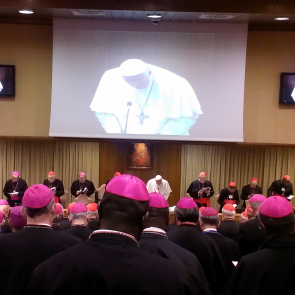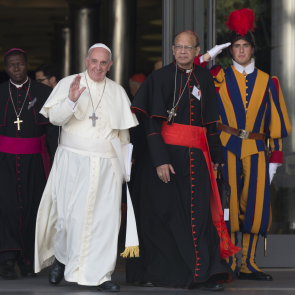A senior cardinal who is close to Pope Francis says that a story claiming he is suffering from a brain tumour is intended to weaken his authority.
Cardinal Oswald Gracias of Bombay, a member of the Pope’s group of cardinal advisers known as the C9, says he was immediately suspicious when heard the claim made in an Italian newspaper on Wednesday.
Pope Francis’ spokesman has emphatically denied the story, which was published in the final week of the Synod on the Family. The Japanese neurosurgeon, Dr Takinora Fukoshima, who is alleged to have examined the Pope also said the account was “completely false”.
Cardinal Gracias told The Tablet on Thursday night that the story indicates that there are people who want to damage the Pope.
“It’s the first thought that came to me. Somebody is trying to weaken the Pope’s position and to indicate “Ok now that’s it, he is just here for a short time,” said Cardinal Gracias.
The cardinal thought the motivation for the story could be to try to “put the brakes” on his reforms.
“It has something to do with his popularity. What he is saying is just the Gospel so I can’t see why they are upset up about it,” he added.
MORE NEWS, MORE ANALYSIS IN THE TABLET...
Read full analysis and comment on all the latest stories in this week’s print edition of The Tablet. To subscribe click here
Cardinal Gracias also disclosed that he is unhappy about the leaked letter to the Pope signed by 13 cardinals, which expressed concerns about the process adopted by the synod. He said individual cardinals had the right to write to Francis but that writing collectively was wrong.
“When you get together then you are trying to put pressure and letters leak. It’s not the best thing in the Church. Thank God it didn’t influence the synod at all,” said Gracias.
The Synod Fathers today have the opportunity to suggest amendments to the final document before it is delivered to the Pope tomorrow.
Cardinal Gracias, who is a member of the drafting committee for the final document, said he did not expect the synod to arrive at a consensus on the issue of whether divorced and remarried Catholics should be allowed to receive Communion, one of the most contested issues considered by the synod.
The drafting committee had to consider more than 1,000 points, known as a modi, put forward in small group discussions at the synod. Cardinal Gracias was confident that the committee would deliver a final document that would reflect the “sense of the house”.
ALL THE LATEST FROM THE SYNOD ON THE FAMILY...
Communion: internal solution for divorcees that's already there - Christopher Lamb
Pope's brain tumour claims were 'attack on his authority' - Elena Curti
Synod is about more than just family, it's about a legacy - Christopher Lamb
Francis: Synod is unfinished business of Vatican II - Sean Smith
Nichols celebrates shift away from Eurocentric Church - James Roberts
Wuerl disputes claims of synod manipulation
Can the Church cope with a bit of mess? - Christopher Lamb
Nichols: synod should accentuate positives in family - Christopher Lamb
Will the synod fathers be surprised by the Spirit? - Christopher Lamb
Pope: divorced and remarrieds not the only subject for synod
Synod will not change teaching on communion for divorcees - Christopher Lamb
Synod must not see family as the problem - James Roberts
“Compared to what I saw before, there has not been much contradiction. The previous times one said black and one said white and you throw out both. That didn’t happen this time. It was more a sense of less strongly, more strongly, a little bit, it was more like that.
"That’s why I think there was general consensus. On the sticking points there won’t be clear answers but there is sufficient matter for us to take forward. The Pope
will certainly study it, and the bishops.”
Cardinal Gracias said that the synod would probably reiterate traditional doctrine on homosexuality.
“There was a focus on respect for gay people, acceptance of them and the accompaniment of families who have members who are gay. But gay unions certainly will not be acceptable,” he said.
KEEP UP TO DATE ON TWITTER AND FACEBOOK...
Follow all the latest news and events from the Catholic world via The Tablet's Twitter feed @the_tablet
Or you can join in the debate at our community page on Facebook




 Loading ...
Loading ...